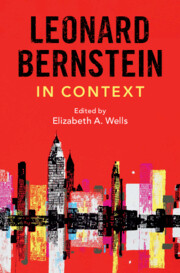Book contents
- Leonard Bernstein in Context
- Composers in Context
- Leonard Bernstein in Context
- Copyright page
- Contents
- Illustrations
- Musical Examples
- Contributors
- Preface
- Part I Bernstein’s World
- Chapter 1 Education
- Chapter 2 Mishkan Tefila
- Chapter 3 Jewishness
- Chapter 4 Sexuality, Relationships, and Family Life
- Chapter 5 Civil Rights Activist and Vietnam War Resister
- Chapter 6 The Cold War, Democracy, and Hope
- Part II Conducting
- Part III Composition, Creation, and Reception
- Part IV Bernstein as Musical and Cultural Ambassador
- Part V Connections
- Part VI The Legacy
- Further Reading
- Index
Chapter 2 - Mishkan Tefila
from Part I - Bernstein’s World
Published online by Cambridge University Press: 06 April 2024
- Leonard Bernstein in Context
- Composers in Context
- Leonard Bernstein in Context
- Copyright page
- Contents
- Illustrations
- Musical Examples
- Contributors
- Preface
- Part I Bernstein’s World
- Chapter 1 Education
- Chapter 2 Mishkan Tefila
- Chapter 3 Jewishness
- Chapter 4 Sexuality, Relationships, and Family Life
- Chapter 5 Civil Rights Activist and Vietnam War Resister
- Chapter 6 The Cold War, Democracy, and Hope
- Part II Conducting
- Part III Composition, Creation, and Reception
- Part IV Bernstein as Musical and Cultural Ambassador
- Part V Connections
- Part VI The Legacy
- Further Reading
- Index
Summary
Although Leonard Bernstein wrote music in a variety of genres and styles, he was unusual in that he consistently created music infused with a Jewish flavour, whether consciously or not, throughout his career. Bernstein’s Jewish background has provided ample fodder for numerous articles and books, but most scholars are unaware of the true significance of his childhood synagogue in Boston, Congregation Mishkan Tefila. Its rabbi, Herman Rubenovitz (1883−1966), the cantor, Iszo Glickstein (1891−1947), and especially its music director, Solomon Braslavsky (1887−1975), made a lifelong impression on Bernstein. Mishkan Tefila served as the venue for some of Bernstein’s earliest piano performances, and he heard an organ and a choir here for the first time; it continued to serve as a Jewish anchor for him even as an adult. In the absence of early formal musical training, the synagogue became, in effect, Bernstein’s conservatory, and these three men his professors.
- Type
- Chapter
- Information
- Leonard Bernstein in Context , pp. 11 - 17Publisher: Cambridge University PressPrint publication year: 2024

